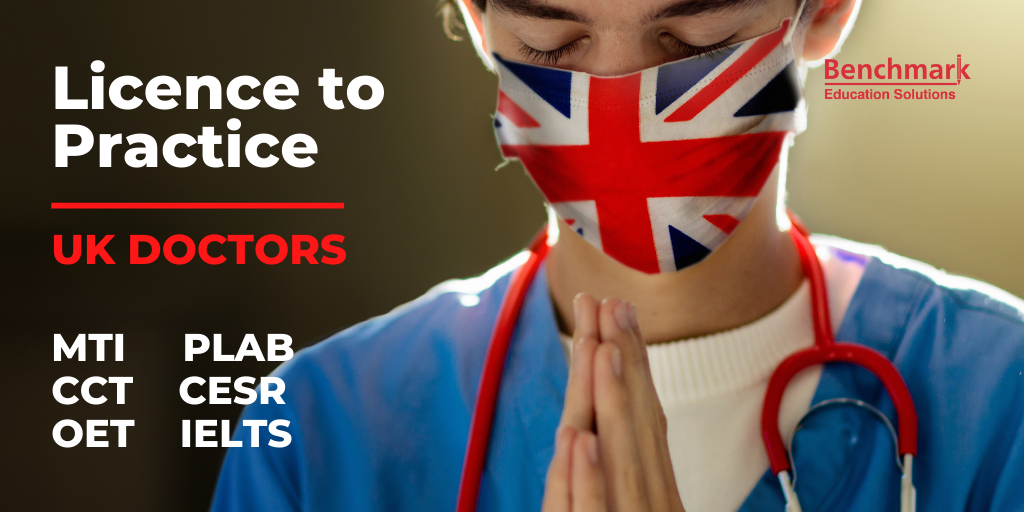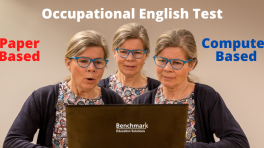
Registration Guide to UK Doctor Licence Via GMC
Have you ever considered changing where you live, where you work, your entire life? Thinking about the future can be challenging for doctors. Too many choices and countless opportunities.
Table of Contents
- Medical Training Initiative (MTI)
- Professional & Linguistic Assessments Board (PLAB 1)
- Professional & Linguistic Assessments Board (PLAB 2)
- MLA Exam Medical Licensing
- Certificate of Eligibility for Specialist Registration (CESR)
- Certificate of Completion of Training (CCT)
- Occupational English Test (OET)
- International English Language Testing System (IELTS)
Each country has its own requirements for living and qualifications for working. Also, change isn’t easy, it requires effort, preparation and time, but this is how you ultimately grow.
As an example, working in the UK can be of a great benefit to international doctors. Not only can it offer you work experience in one of the world’s largest and most established healthcare systems, but it can also offer you training, a way to specialist and consultant position, not to mention a possibility of a nationality after fulfilling certain conditions.
If you have considered working as a doctor in the UK, it is essential to know what is required and prepare ahead.
Practicing medicine in the UK:
- Working as a doctor in the UK requires certain qualifications that definitely change depending on where you studied medicine, if you did or didn’t practice, if you have a postgraduate specialist certificate, and how many years of experience you do have. You will also be asked to take an English test, such as IELTS or OET, if you are national of a country where English is not a first language.
- You initially have to get a GMC registration through on of the following:
- MTI
- PLAB
- Membership exams offered by royal colleges, which vary depending on specialty, as FRCA for anesthesiology, MRCP for internal medicine and MRCOG for obstetrics.
But first, you need to make sure you have Acceptable Primary Medical Qualification (PMQ), check the GMC website to find out if your medical school is recognized.
You also need to understand there are two types of jobs there: Service and training jobs. Training jobs are very competitive and very hard to land, but not impossible.
Multiple pathways are available for doctors, they can be summarized as follows:
Medical training initiative (MTI) pathway:
- Designed to offer training in the NHS for international medical personnel.
- Training only for 2 years (Tier 5 visa), then candidates should return to their home country.
- Suitable for young physicians, with at least 3 years experience in the specialty.
- UK residents can’t apply, neither can doctors who set the PLAB test.
- After COVID, it is no longer required to travel home then apply for jobs to be able to come back to work in the UK on Tier 2 visa after MTI period is finished. This can all be done now while within the UK.
Professional and Linguistic Assessments Board (PLAB) pathway:
PLAB exam is similar to a bachelor degree, it is very basic and fundamental knowledge, it consists of 2 parts:
PLAB 1
- Cost £240, from 1 April 2021.
- About 180 MCQs.
- Usually being held in too many countries at least 4 times a year nowadays.
- Results announced in 6 weeks.
PLAB 2
- Cost £879 from 1 April 2021
- Need to apply for a visa to be able to enter the UK, as it is held in Manchester.
- The visa is typically valid for about 6 months, so you better apply after booking the exam to make sure the visa is still valid at time of exam.
- Exam consists of 3 hours of different clinical situations.
- The most important thing to keep in your mind is being a safe doctor, doing things professionally, communicating well, and you can still pass even if you haven’t answered all questions correctly.
- It is recommended to take a course before the exam, it will help you train well with native people.
MLA Exam Medical licensing assessment
Starting from 2024, the UK will start a new exam instead of PLAB. It is a universal exam for all medical schools inside and outside the UK. It will be the same for both UK medical students and immigrants. Likewise, it is basically similar to a PLAB exam; basics and fundamentals.
This exam will only apply to the PLAB route, other routes will go on as usual and won’t need this exam.
Certificate of Eligibility for Specialist Registration (CESR)
- It is a route for specialist registration for doctors who didn’t complete a GMC-approved program, but still are well-trained and highly qualified.
- Applications made via GMC online
- Fees £1676
- Before you apply, read the specialty specific guidance (SSG) and updated specialty curriculum from the GMC website.
Certificate of Completion of Training (CCT)
- Excellent way to become a substantive consultant.
- Can only be acquired through training in the UK.
- Advantages over CESR: Easier, less time-consuming and fewer paperwork
- Downsides of CCT: Difficult to get into training, rotating between hospitals and repeated relocation which can be challenging for families.
Language exams – OET or IELTS
English tests are of great importance to doctors who would like to train or work in the UK. That’s definitely because whatever the medical specialty or the pathway taken, it all comes down to passing the English test with the required score to get your license to practice. Recognizable language tests are: IELTS and OET Both tests have 4 sections: Listening, writing, reading and speaking.
International English Language Testing System (IELTS) Academic
- You are required to score minimum 7.0 in all elements, with overall score of 7.5
- If you need more information regarding the exam tips& tricks, and how to get well-prepared, this list of blog posts will provide you valuable insights.
Occupational English test (OET)
- In OET (Medicine version), you are required to get a minimum score of 350 or grade B in all sections in one sitting if you are using your oet for PLAB, GMC registration, work visa, non-training jobs, or training jobs after FY2 level.
- A minimum score of 400 in all sections in one sitting is required if your OET certificate is used for FY1 through the UK Foundation Programme or standalone FUY2.
- Some doctors say it is easier to get the score required from OET than IELTS, if you can afford the financial difference between the 2 exams.
Take care:
The validity of both English exams is only 2 years, so you need to make sure your Language test is valid both when you set for PLAB 1, and when you reach the step of GMC registration. You can start practicing and preparing as early as you want, but postpone the actual exam time as explained.
Benefits of mastering English language:
It is essential to get GMC registration, but this is not the only catch.
Moving, living and working in a different country is a big challenge, and the most important thing that can help you face those challenges is communication.
Communication with your patient, supervisors, colleagues on a professional scale, and social communication with neighbors, cohabitants and making connections. For all that you need to have a good English level, Mastering the language can benefit you in so many ways you can’t imagine.
So whatever you do, make sure to study for English tests with passion and motivate yourself all through the road. It might not be so easy, but it will be absolutely worth it.








